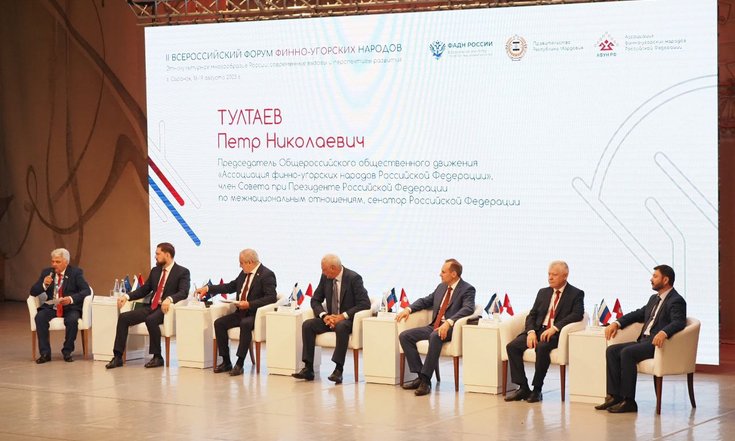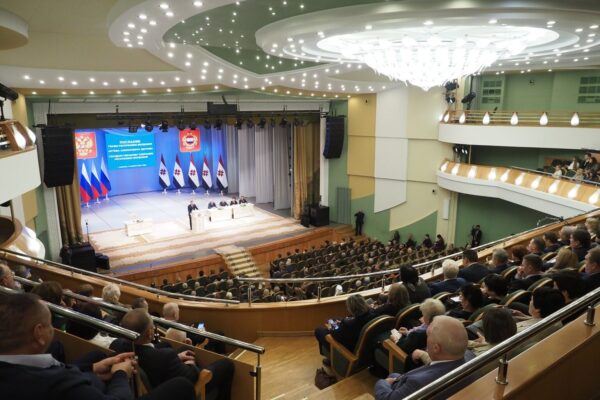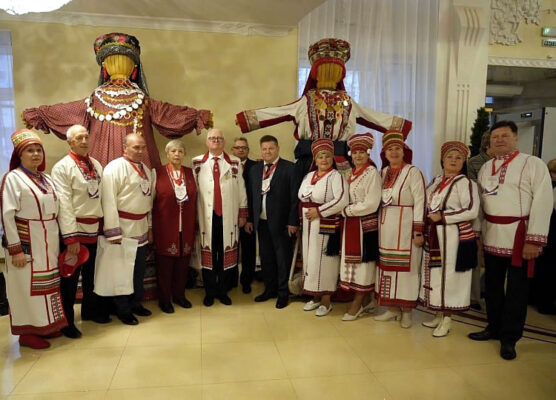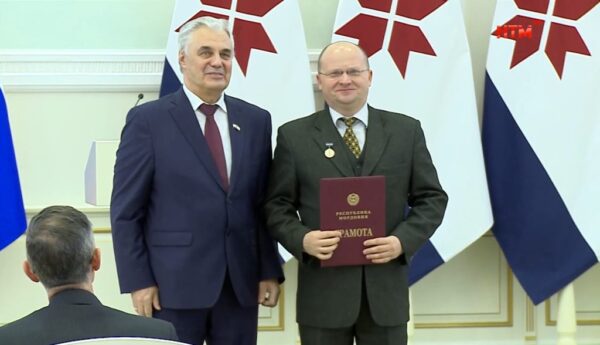The II Forum of Finno-Ugric Peoples of the Russian Federation was held in Saransk, Russia
The II Forum of Finno-Ugric Peoples of the Russian Federation “Ethno-cultural diversity in the Russian Federation: contemporary challenges and development perspectives” took place in Saransk, the capital of the Republic of Mordovia, on 16–19 August.

Shortly before the forum, the main organiser of the event, President of the Association of Finno-Ugric Peoples of Russia Pyotr Tultayev, gave an interview to the newspaper Komsomolskaya Pravda, in which he spoke about the forum as one of the key events in the country’s national policy.
He welcomed the large number of delegations that have registered for the Forum. “For the first time, delegations from Kazakhstan, Crimea, Sevastopol, as well as from the new territories annexed to Russia will participate,” he noted.
He said that twenty seven Finno-Ugric peoples live in Russia and there are no conflicts between them, despite the fact that the collective West has tried to create divisions between the different ethnic groups. “We know that our enemies have real plans to use the Finno-Ugric factor in these dirty games. But we, the Finno-Ugric peoples of the Russian Federation, are for the unity of our country, and this is our centuries-old choice,” Pyotr Tultayev said.
The Pan-Russian Forum is primarily aimed at working on the preservation and development of the mother tongues, traditions and spiritual and cultural heritage of the Finno-Ugric peoples living in the country. According to the Ministry of Education of the Russian Federation, 14 Finno-Ugric languages are taught as mother tongues, with a total of 60,000 Finno-Ugric pupils learning their mother tongue. In addition, 116,000 pupils study Finno-Ugric as a state language.
A special feature of the forum is that a large number of students took part, as young people in particular have become more interested in national movements compared to the previous forum. “We set up a separate IT section where powerful projects for the digitisation of Finno-Ugric languages can be submitted and could be used in the future throughout the country, not only among Finno-Ugric peoples,” said Tultayev.
“I find it unacceptable that some colleagues try to rely on foreign countries and organisations. We have seen time and again that, under the guise of helping our organisations, they are guided by a different agenda: hostility and a desire for destruction. It is necessary for us to stand our ground…,” Tultayev said.
The first Forum of Finno-Ugric Peoples took place in Izhkar (Izhevsk) in June 2021. Its aim was to split the Finno-Ugric movement and boycott the World Congress of Finno-Ugric Peoples in Tartu. The Association’s resolution, signed by Pyotr Tultayev, declared the organisation of world congresses to be impractical.
The opening day of the II Forum in Saransk was a day of festivities and a packed cultural programme. Delegations from 36 regions of the Russian Federation were present, plus representatives from other regions, for a total of 2,500 participants.
Several regions were represented at the local government level, such as the Republic of Mari El. The Forum was attended by a number of top officials of the Russian Federation, such as the Chairman of the Presidential Administration, Magomedsalam Magomedov, who read out Vladimir Putin’s greeting, saying: “The outstanding achievements of these peoples in all their diverse spheres have become an integral part of the richest historical, scientific, cultural and spiritual heritage. And nowadays, the representatives of the Finno-Ugric peoples are demonstrating manliness and valour in battle in military operations, drawing on the traditions of their ancestors’ patriotism. I would like to stress that the state will continue to give priority to the preservation of ethnic and cultural identity, civic unity, peace and harmony in the country. It is gratifying that authoritative movements such as the Association of Finno-Ugric Peoples of the Russian Federation are actively involved in this great and demanding work. I am convinced that the current meeting will be held in a creative, constructive way and will give rise to new promising educational and enlightenment projects. I wish you success and all the best.” Sergey Neverov, Deputy Speaker of the Duma of the Russian Federation, Igor Barinov, Head of the Agency for National Affairs of the Russian Federation and others were also present.
Their speeches were more or less formal, some of the proposals made were very sensible, such as paying attention to particularly endangered languages, textbooks in these languages, and in particular the need to digitise languages with a small number of speakers. At the same time, however, issues relating to the Finno-Ugric peoples with statehood were raised. For example, Igor Barinov, head of national policy in the Russian Federation, said: “The geopolitical changes of the last one and a half years are a special period for our country, the pressure of unfriendly countries on the relations between the peoples of Russia has intensified. We are talking in particular about Estonia and Finland, led by people from across the ocean. After the start of the special military operation, ideas of separatism, extremism, including towards Finno-Ugric peoples, have been actively spread. Emphasis is being placed on violations of civil rights, and constructive citizens are being discredited. The executive authorities must ensure the maximum level of communication with citizens on the ground and keep the situation under special control.”
This year, the Forum was divided into three sections: heritage culture, IT technologies in the cultural and linguistic field, and youth projects.
Separately, there was a debate on cooperation on topical issues of state national policy.
The Forum awarded prizes for the best youth projects, such as the first prize to Bogdan Anfinogenov for his Internet TV channel “Daur TV”. “This is the only TV channel of Finno-Ugric peoples in the Russian Federation that works around the clock and is entirely in the national language,” said Anfinogenov.
The Forum closed with the Youth Festival of National Cultures “We Are Together”, featuring performances by the Udmurt National Theatre’s dance and singing ensemble Aikai, the Mordovian folklore ensemble Merema, the Tatarstan folklore ensemble Agidel, the Skrynya ensemble from Krasnodar, the Ossetian ensemble Ritmy Gor and the academic song and dance ensemble Donbass. There were also various folklore ensembles from villages in the Republic of Mordovia.
What can we say to sum up? This year’s Forum was a grandiose event, noteworthy even on a Russian scale, and covered by almost all the media. There is a lot of interesting and important talk about Finno-Ugric peoples. At the same time, there is talk of how the Finno-Ugric states that have achieved national independence are evil and are dividing the Finno-Ugric peoples. They have become particularly evil in the last few years.
On the other hand, the nature of the national policy of the Russian Federation, which is geared towards consolidation, is clearly visible. The Donbass, the Ossetians, the Tatars, the city of Krasnodar are all present at the event, which is a major event for the Finno-Ugric peoples. It is clear from Tultayev’s interview, and indeed from elsewhere, that we are no longer talking about nationalities, but about ethnos, ethnic groups, and that is also a sign. The themes of the sections are more or less the same as they were at the First Forum of Finno-Ugric Peoples, but even more concise. Of course, there is no more talk about the problems or rights of Finno-Ugric peoples, the duties and responsibilities of state authority. The Finno-Ugric people, on the other hand, are good, they are fighting for Russia in Ukraine – that is how one can understand Putin’s greeting. Putin does not explain why these peoples, who are almost the smallest in number, have to shed blood and ‘defend’ the Russians (Russian language) in Ukraine – this is obviously not discussed on the forum either.
At the beginning of September, Fenno-Ugria will give a more detailed account of the Forum as a major event for the Finno-Ugric peoples of Russia.
- II Всероссийский форум финно-угорских народов «Этнокультурное многообразие России: современные вызовы и перспективы развития» пройдет в г. Саранске 16-19 августа (Fadn.gov.ru 31.07.2023, in Russian)
- II Всероссийский форум финно-угорских народов пройдет в г. Саранске 16-19 августа (AFUN RF, 01.08.2023, in Russian)
- Финно-угорские народы России за межнациональное согласие (Kp.ru 15.08.2023, in Russian)
- В Мордовии обсудили этнокультурное многообразие России (Pfo.gov.ru 17.08.2023, in Russian)


